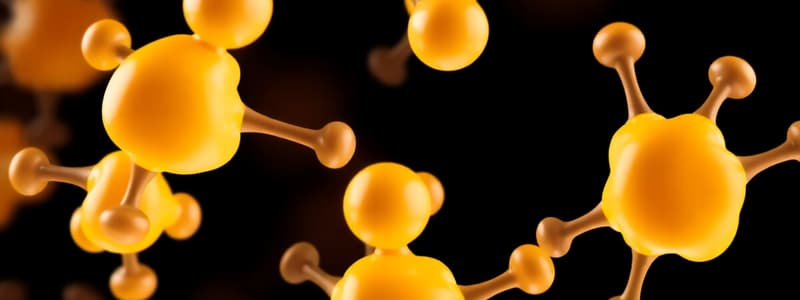Podcast
Questions and Answers
What is the primary role of nascent VLDL in the body?
What is the primary role of nascent VLDL in the body?
- They facilitate the uptake of glucose by cells.
- They transport proteins to the liver.
- They deliver endogenously derived lipids to peripheral tissues. (correct)
- They store fatty acids in adipose tissue.
What is the energy yield from the complete oxidation of fatty acids as compared to carbohydrates?
What is the energy yield from the complete oxidation of fatty acids as compared to carbohydrates?
- 4 kcal/g for fats compared to 9 kcal/g for carbohydrates.
- 9 kcal/g for fats compared to 4 kcal/g for proteins.
- 7 kcal/g for fats compared to 6 kcal/g for carbohydrates.
- 9 kcal/g for fats compared to 4 kcal/g for carbohydrates. (correct)
Which enzyme initiates the hydrolysis of triacylglycerols (TAG) in adipocytes?
Which enzyme initiates the hydrolysis of triacylglycerols (TAG) in adipocytes?
- Diacylglycerol lipase
- Monoacylglycerol lipase
- Hormone-sensitive lipase (correct)
- Glycerol kinase
Why can't adipocytes metabolize the glycerol released during TAG degradation?
Why can't adipocytes metabolize the glycerol released during TAG degradation?
What occurs to the free fatty acids after they are released from the adipocytes?
What occurs to the free fatty acids after they are released from the adipocytes?
What is the primary function of triglycerides stored in adipose cells?
What is the primary function of triglycerides stored in adipose cells?
Which of the following lipoproteins is responsible for the transport of endogenous triglycerides?
Which of the following lipoproteins is responsible for the transport of endogenous triglycerides?
How are fatty acids esterified in triacylglycerols?
How are fatty acids esterified in triacylglycerols?
What happens to triglycerides after they are broken down by lipoprotein lipase?
What happens to triglycerides after they are broken down by lipoprotein lipase?
Which type of cholesterol-rich lipoprotein is synthesized in the mucosa of the intestine?
Which type of cholesterol-rich lipoprotein is synthesized in the mucosa of the intestine?
What is the fate of absorbed triglycerides in the bloodstream?
What is the fate of absorbed triglycerides in the bloodstream?
In which type of tissue is the majority of triglyceride stored?
In which type of tissue is the majority of triglyceride stored?
What occurs in the endoplasmic reticulum of enterocytes concerning triglycerides?
What occurs in the endoplasmic reticulum of enterocytes concerning triglycerides?
Flashcards
What is the role of nascent VLDL in lipid transport?
What is the role of nascent VLDL in lipid transport?
Nascent VLDL is secreted directly into the bloodstream and delivers endogenously derived lipids to peripheral tissues.
Why are TAGs considered energy-rich molecules?
Why are TAGs considered energy-rich molecules?
TAGs are highly reduced molecules, meaning they store a lot of energy when fully oxidized to CO2 and H2O. This is why fats are so energy-dense!
How are stored fats mobilized in the body?
How are stored fats mobilized in the body?
Hormone-sensitive lipase, triggered by hormones like epinephrine or glucagon, initiates the breakdown of TAGs by removing fatty acids from carbons 1 and/or 3.
What happens to the glycerol released from TAG breakdown?
What happens to the glycerol released from TAG breakdown?
Signup and view all the flashcards
What happens to the fatty acids released from TAG breakdown?
What happens to the fatty acids released from TAG breakdown?
Signup and view all the flashcards
Resynthesis of TAG and cholesteryl esters
Resynthesis of TAG and cholesteryl esters
Signup and view all the flashcards
Chylomicrons
Chylomicrons
Signup and view all the flashcards
Fate of Absorbed Fat (Exogenous Triglycerides)
Fate of Absorbed Fat (Exogenous Triglycerides)
Signup and view all the flashcards
Endogenous Triglycerides
Endogenous Triglycerides
Signup and view all the flashcards
Adipose Tissue
Adipose Tissue
Signup and view all the flashcards
Triacylglycerol (TAG)
Triacylglycerol (TAG)
Signup and view all the flashcards
Lipoprotein Lipase
Lipoprotein Lipase
Signup and view all the flashcards
Mobilization of TAG
Mobilization of TAG
Signup and view all the flashcards
Study Notes
Biochemistry of Triglycerides
- The lecture covers the metabolic pathways of triglycerides.
Specific Objectives
- Students should be able to explain metabolic pathways of triglycerides.
Triglyceride Absorption and Transport
- Bile salts emulsify large fat droplets from the stomach.
- Pancreatic lipase and colipase break down fats into monoglycerides and fatty acids.
- Monoglycerides and fatty acids move into intestinal cells by diffusion.
- Cholesterol is transported into cells.
- Absorbed fats combine with cholesterol and proteins in intestinal cells to form chylomicrons.
- Chylomicrons are removed from the lymphatic system.
- The mixture of absorbed lipids migrates to the endoplasmic reticulum.
- Biosynthesis of complex lipids takes place, synthesizing triglycerides (TAG).
- Newly synthesised TAGs and cholesterol esters are hydrophobic and aggregate to form chylomicrons.
- Chylomicrons are small fat globules composed of protein and lipid secreted into blood and lymphatic vessels.
Fate of Absorbed Fat/Triglycerides
- Triglycerides are transported in the blood as chylomicrons.
- Blood becomes milky after lipid-rich meals due to elevated chylomicron levels.
- Adipose tissue and the liver absorb chylomicrons.
- The liver synthesizes endogenous triglycerides.
- Endogenous triglycerides are transported in blood as VLDL (very low-density lipoproteins).
- VLDL are deposited in adipose tissue.
- Lipoprotein lipase breaks down triglycerides in lipoproteins into smaller fatty acids and monoglycerides.
- Smaller fatty acids and monoglycerides are transported into tissues.
- Some are burned for fuel, others are re-assembled into triglycerides for storage.
Triacylglycerols (TAG)
- TAGs are stored in adipose cells and are the body's major energy reserve.
- TAGs are composed of three fatty acids and one glycerol molecule.
Triglyceride Hydrolysis
- The mobilization of stored fat requires the hydrolytic release of fatty acids and glycerol from TAGs.
- This process is initiated by hormone-sensitive lipase, like epinephrine or glucagon, which removes fatty acids from carbon 1 and/or 3 of the TAG.
- Additional lipases that target diacylglycerol or monoacylglycerol remove remaining fatty acids.
Fate of Glycerol
- Glycerol released during TAG degradation cannot be metabolized in adipocytes. This is due to a lack of glycerol kinase.
- Glycerol is transported via the blood to the liver for phosphorylation.
- Phosphorylated glycerol can be used to form TAGs in the liver or participate in glycolysis and gluconeogenesis.
Fate of Fatty Acids
- Free fatty acids move across the adipocyte cell membrane, binding to plasma albumin.
- Fatty acids reaching the liver are oxidized to release energy.
Studying That Suits You
Use AI to generate personalized quizzes and flashcards to suit your learning preferences.



